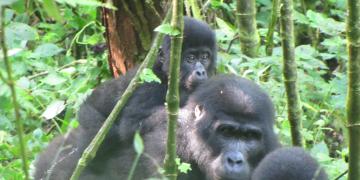
Medard
Twinamatsiko
Dr. Medard Twinamatsiko is male Ugandan with a great passion and experience in development conservation and natural resource governance. I have pioneered the development of the indigenous people’s cultural values and indigenous knowledge approach to conservation which has saved may great apes from extinction. Medard has participated in the pioneering of key Integrated Conservation and Development methodologies such as Equitable Conservation, Cultural Values Conservation and Governance models to conservation. I have over 15 years of progressive research, academic engagement and management of half of which have resulted into the successful implementation of two Darwin Initiative conservation projects in collaboration with the Fauna and Flora International and another with the International Institute for Environment and Development, London (https://www.iied.org/users/medard-twinamatsiko). One of the projects focused on the Batwa people of Bwindi, Mhahinga and Semliki National Parks titled “Integration of Batwa Indigenous Knowledge and Cultural Values into the Conservation of Bwindi, Mgahinga and Semliki National Parks” and another on “Conservation through Poverty Alleviation”. I have finished a project funded by the Critical Ecosystem Partnership Fund titled “Enhancing Biodiversity Conservation at Bwindi: A Batwa Cultural Co-Management Approach. In general, I have worked with indigenous people including the Batwa for the last 13 years. Dr. Twinamatsiko has a PhD in Policy Management and Natural Resource Governance. Medard is an Executive Director for the Centre for Research Uptake in Africa (CRU-Africa) and a Senior Researcher/Lecturer in the Department of Environment and Livelihood Support Systems, Faculty of Interdisciplinary Studies at Mbarara University of Science and Technology (MUST), Uganda since 2009. He also works as the Director for the Centre for Innovations and Technology Transfer (CITT) - MUST. The Centre is in charge of all innovations, skills development and technological transfer at MUST. He is also a Senior Social Research Consultant at the Institute of Tropical Forest Conservation (ITFC), a postgraduate and research Institute of MUST, located in Bwindi Impenetrable National Park where he has previously worked as the Head of Social Research Department for four and a half years. At Bwindi, just like some other protected areas in Uganda, Dr. Twinamatsiko has facilitated research to action community-based conservation interventions that link local people to sustainable conservation through enhancement of alternative livelihood options that reduce pressure on Protected Area resources and save the extinction of Endemic species such as tropical mountain gorillas. The key focus in alternative livelihoods has been on the dimensions of equity and application of governance principles. In this context, he has led the pilot studies of Social and Governance Assessment of Protected Areas methodologies commonly known as SAPA and GAPA. In advancing GAPA methodology, he was the chief actor in the governance assessment documentary funded by the Ecosystem Services for Poverty Alleviation (ESPA) https://www.iied.org/understanding-governance-equity-conservation. He has done several researches around protected areas in the Albertine rift and has been actively involved in developing an equity framework in protected area management with Kate and Phil from UK. In addition, he has been the Lead Researcher on several social research projects funded by Darwin Initiative, Conservation International, Great Virunga Transboundary Collaboration, Bwindi Mgahinga Conservation Trust, Birdlife International, International Institute for Environment and Development, Flora and Fauna International (www.iied.org/uganda-project-strengthen-policies-link-poverty-conservation;darwin.defra.gov.uk/newsletter/july2013newsletter.pdf) and currently the Critical Ecosystem Partnership Fund project that enhances the biodiversity of Bwindi using a Batwa cultural co-management approach.
Apart from research, Dr. Twinamatsiko is an experienced seasonal manager and has held other several managerial positions as the Deputy Director- CITT, Ag. Deputy Director- Directorate of Research and Graduate Training, MUST; Associate Director for Postgraduate Studies and Research Directorate in Charge of Research, Innovations, Extensions and Publications, (KIU); Head of Department at both MUST and other Universities in Uganda and a Child Development Officer for a community based Compassion International charitable organisation. The Centre for Research Uptake in Africa (CRU-Africa) translates research findings into action at community implementation and policy engagement levels. His passion and research interest is in policy engagement and research uptake for Natural Resource Governance. Since 2009 to the current date, he has had an interface to work for the conservation of Uganda’s protected areas such as Queen Elizabeth National Park, Lake Mburo National Park, Semuliki National Park, Bwindi Impenetrable National Park and Mgahinga Gorilla National Park where he has undertaken various studies on natural resource competition and resource-based conflicts. Dr. Twinamatsiko is highly motivated, and a deeply committed development conservationist. Throughout his career over the last twelve years, he has been working to strengthen the management and governance of protected areas and ensure that communities neighbouring protected areas develop positive attitudes towards the conservation of such areas especially ecological sensitive areas such as Bwindi Impenetrable National Park and Mgahinga Gorilla National Park. His previous experience has brought new learning challenges for him to achieve in order to undertake his work to the highest standard. He has widely published in the area of natural resource governance (https://scholar.google.com/citations?user=zPpan0gAAAAJ&hl=en), has won several grants and awards on top of supervising postgraduate students. He is now an Africa Oxford Initiative (AfOx) fellow for 2018.